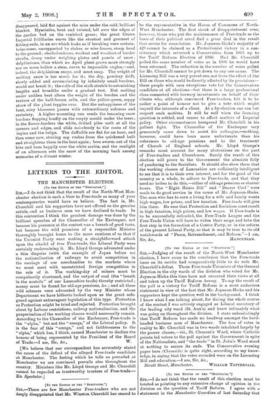[To TEE EDITOR Or THE " SpEcrATort."
Sin,—.There are few Manchester Free-traders who are not deeply disappointed that Mr. Winston Churchill has oeased to
be the representative in the House of Commons of North- West Manchester. The first shock of disappointment over, however, those who put the maintenance of Free-trade as the basis of their political creed find a great deal in the result that serves for consolation. Mr. Joynson-Ilicks's majority ef 429 cannot be claimed as a Protectionist victory in a con- stituency which returned a Conservative from 1885 up to the Tariff Reform Election of 1906. Had Mr. Churchill polled the same number of votes as in 1906 he would have been returned. The reduction in the number of votes polled for Mr. Churchill cannot be put down to any one cause. The Licensing Bill was a very potent one, not from the effect of the Bill on those whowould be directly affected by its provisions— these people with rare exceptions vote for the Conservative candidate at all elections—but there is a large professional class connected with brewery investments on behalf of their clients who, although convinced Free-traders, felt it to be rather a point of honour not to give a vote .which might imperil the interests of a client. At a by-election one can but respect such motives. It will be well when the licensing question is settled, and ceases to affect matters of Imperial policy. Other circumstances hampered Mr. Churchill in his gallant fight. The Chancellor of the Exchequer very generously came down to assist his colleague,—nothing, however, could have been more unfortunate than his references to old-age pensions and to the treatment of Church of England schools. Mr. Lloyd George's remarks must account for many abstentions on the part of Free-traders and Churchmen. Surely the result of this election will prove to the Government the absolute folly of pandering to the Socialists. It should also show them that the working classes of Lancashire are sufficiently intelligent to see that it is to their own interest, and for the good of the country as a whole, to adhere to Free-trade, and that they need no bribes to do this,—either of old-age pensions or shorter hours. The "Eight Hours Bill" and "Dearer Coal" were made to do good service in the cause of Mr. Joyuson-Hicks. The man who has to earn a living for a wife and family wants high wages, low prices, and low taxation. Free-trade will give him these. He sees that Protection and Socialism must result in high taxation, high prices, and low wages. If Free-trade is to be successfully defended, the Free-Trade League and the Free-Trade Union will have to widen their scope and take the first step in the formation of a Centre Party, or in the reform of the present Liberal Party, so that it may be true to its old watchwords of "Peace, Retrenchment, and Reform."—I am,








































 Previous page
Previous page